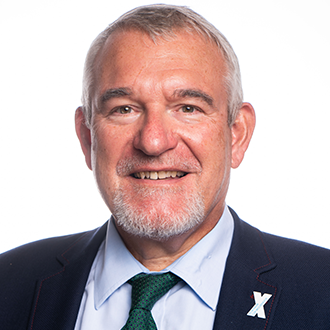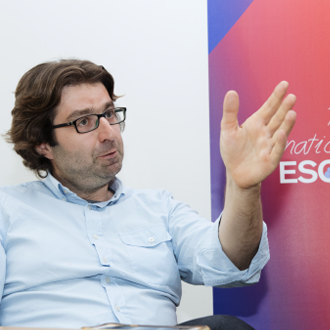Keynote Speaker
-
 Jörg Fegert Universitätsklinikum Ulm, DEJörg Fegert
Jörg Fegert Universitätsklinikum Ulm, DEJörg FegertDirecteur médical, Clinique universitaire d'Ulm, DE
Prévenir, c'est guérir : Prévention sélective et indiquée by adverse childhood experiences (ACE)
Le concept cliniquement pertinent de la prévention/intervention précoce indiquée est présenté par rapport aux événements stressants de l'enfance (ACE). Le point central est que l'accumulation de stress, tels que différentes formes de maltraitance et de négligence infantiles ou de stress dans la famille d'origine, est pertinente pour le coping avec d'autres stress et pour des maladies consécutives potentielles ou pour la résilience. Les expériences d'attachement dans la petite enfance et la capacité de réhabilitation ont un effet protecteur. La négligence précoce massive et la maltraitance émotionnelle, y compris entre pairs ou frères et sœurs, sont des facteurs de stress cliniquement significatifs. Les formes numériques d'agressions liées à la technologie, le cyberharcèlement, etc., sont encore trop peu prises en compte sur le plan clinique. La stigmatisation et surtout l'auto-stigmatisation entraînent souvent chez les personnes concernées, en plus des réactions de stress, un retrait social et des déficits de participation croissants. Cela souligne l'importance des interventions précoces du point de vue de la psychopathologie du développement : La prévention peut intervenir dans le déroulement du développement de manière à le soutenir, voire à le guérir.
-
 Tamsin Ford University of Cambridge, UKTamsin Ford
Tamsin Ford University of Cambridge, UKTamsin FordHead of Department, University of Cambridge, Department of Psychiatry, UK
Prevention in schools
This talk will discuss why schools offer potential for prevention and discuss the related evidence base for schools as a good setting for the primary and secondary prevention of mental health conditions in children and adolescents
-
 Patrick Luyten UC London, UK | University of Leuven, BEPatrick Luyten
Patrick Luyten UC London, UK | University of Leuven, BEPatrick LuytenAssociate Professor at the Faculty of Psychology and Educational Sciences, KU Leuven (University of Leuven), Belgium, Professor of Psychodynamic Psychology at the Research Department of Clinical, Educational and Health Psychology, UCL (University College London), UK, Assistant Professor, Adjunct at the Yale Child Study Center in New Haven, Connecticut, USA.
Patrick Luyten, PhD is Professor of Clinical Psychology at the Faculty of Psychology and Educational Sciences, University of Leuven (Belgium) and at the Research Department of Clinical, Educational, and Health Psychology, University College London (UK). His main research interests are disorders from the affective spectrum (i.e., depression and stress- and pain-related disorders), and personality disorders. In both areas he is involved in basic research and in interventional research. He heads a treatment service for patients with depression and functional somatic disorders in PraxisP, the treatment center of the Faculty of Psychology and Educational Sciences from the KU Leuven, Belgium. Recent books he co-authored include the Handbook of Psychodynamic Approaches (Guilford Press, 2015), Therapeutic work for children with complex trauma: A three-track psychodynamic approach (Routlegde, 2023) and Brief Dynamic Interpersonal Therapy: A clinician’s guide (2nd ed.) (Oxford University Press, 2024).
The role of Parental Reflective Functioning in breaking the cycle of intergenerational trauma: Implications for prevention
Parental reflective functioning (PRF) or parental mentalizing refers to the capacity of the parent to envision their child as being motivated by internal mental states such as feelings, wishes, and desires, and to be able to reflect upon their own internal mental experiences and how they are shaped and changed by interactions with the child. More than three decades of research suggests that this capacity plays an important role in the development of children’s socio-emotional development. Recent research findings suggest that PRF may be particularly important in buffering the effects trauma and adversity, and thus in breaking the cycle of intergenerational trauma, with important implications for prevention and intervention. These findings are reviewed and basic principles of preventative interventions rooted in mentalizing approaches are outlined. I will close this talk with considerations concerning the implementation of interventions focusing on improving the capacity for parental reflective functioning.
Pre-Congress Experts
-
 Maude Schneider UNIVERSITÉ DE GENÈVEMaude Schneider
Maude Schneider UNIVERSITÉ DE GENÈVEMaude SchneiderUniversity of Geneva, Assistant Professor
Digital phenotyping: a tool for the personalization of interventions in psychiatry?
Maude Schneider is assistant professor at the Faculty of Psychology and Educational Sciences of the University of Geneva since 2019 where she heads the Clinical Psychology Unit for Intellectual and Developmental Disabilities. Maude Schneider is working as a clinician and researcher in the field of neurodevelopmental disorders. Using a combination of clinical and cognitive approaches as well as digital phenotyping, her research aims to explore the mechanisms underlying social and mental health difficulties of adolescents and young adults with neurodevelopmental conditions.
In the first part of the presentation, Maude Schneider will present how Ecological Momentary Assessment (EMA) techniques can be used for symptom monitoring and for the exploration of relevant psychological mechanisms underlying the clinical expression of symptoms. In the second part of the presentation, she will highlight how information collected in the flow of daily-life could be used to personalize interventions in the fieldof mental health.
-
 Corrado Sandini UNIVERSITÉ DE GENÈVECorrado Sandini
Corrado Sandini UNIVERSITÉ DE GENÈVECorrado SandiniUniversity of Geneva / Fondation Pôle Autisme, Ambizione Research Fellow / Medecin Chef de Clinique
Potential and challenges of digital phenotyping approaches to understand neurodevelopemental disorders.
Corrado Sandini studied medicine at the University of Genova in Italy. He then pursued a PhD in Neuroscience at the University of Geneva focusing on the developmental of computational approaches, namely dynamic network analysis, to characterize neurodevelopmental and clinical pathways of vulnerability to psychosis in 22q11DS. Since his PhD he divides his time as a resident in child and adolescent psychiatry at the Fondation Pole Autisme in Geneva and research activity. He has been supported by a clinical scientist grant of the NNCR Synapsy to study the role of sleep disturbances in 22q11DS and more recently by an the SNSF Ambizione Fellowship to study the contribution of sleep disturbances in contributing to affective comorbidities in ADHD using an ecological digital phenotyping approach and network analysis techniques.
Corrado will highlight the role that computational analysis techniques might play in the clinical translation of these technologies, by helping clinicians navigate the complexity of digital phenotyping data in a more intuitive and informative way. He will briefly discuss how increasing precision of clinical assessments could help us shed light on differential underlying neurobiological mechanisms.
-
 Maurizia Franscini UNIVERSITÄT ZURICHMaurizia Franscini
Maurizia Franscini UNIVERSITÄT ZURICHMaurizia FransciniKlinik für Kinder- und Jugendpsychiatrie PUK Zürich, Chefärztin
Therapy program Robin: app-assisted treatment for adolescents at increased risk of psychosis
After graduating from the Liceo Cantonale in Locarno, Maurizia Franscini studied medicine first in Bern and then in Zurich, earning her MD in 1995. In 2006, she obtained her specialization in child and adolescent psychiatry and psychotherapy. Since 2000, she been working at the University Psychiatric Clinic in Zurich, where she currently holds the position of head physician. She developed and implemented the therapy App Robin Z at the University Hospital of Child and Adolescent Psychiatry and Psychotherapy, Zürich.
The Robin therapy program was developed in the early recognition center of Zurich with the aims to improve quality of life and daily functioning of adolescents at high risk for psychosis. In this presentation, the Robin therapy program will be presented and the hurdles and special features of treatment of adolescents will be discussed.
-
 Philipp Sterzer UNIVERSITÄT BASELPhilipp Sterzer
Philipp Sterzer UNIVERSITÄT BASELPhilipp SterzerUniveritäre Psychiatrische Kliniken Basel, Professor of Translational Psychiatry
Computational psychiatry - explaining psychosis within the framework of predictive processing
Professor Sterzer studied medicine at the Ludwig Maximilian University Munich and at the Harvard Medical School and obtained his MD in 2001. He habilitated in Experimental Psychiatry at the Charité Berlin. He is board certified in Neurology and Psychiatry. From 2011 he was Professor of Psychiatry and Computational Neuroscience at the Charité and since 2022 he holds position of Professor of Translational Psychiatry, University of Basel, and Chief Physician, Zentrum für Diagnostik und Krisenintervention, Universitäre Psychiatrische Kliniken Basel. His research focuses on predictive coding and computational psychiatry.
There has been an increasing interest in theory-driven computational approaches towards explaining psychiatric disorders in recent years. Philipp will present a Bayesian predictive processing account of psychosis and empirical evidence from recent behavioral, neuroimaging and pharmacological intervention studies supporting this account. Moreover, he will discuss potential implications of such a theory-driven approach for the development of biological and psychological treatments.
